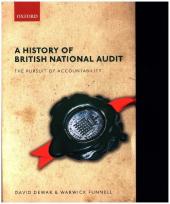 Neuerscheinungen 2017Stand: 2020-02-01 |
Schnellsuche
ISBN/Stichwort/Autor
|
Herderstraße 10
10625 Berlin
Tel.: 030 315 714 16
Fax 030 315 714 14
info@buchspektrum.de |

David Dewar
A History of British National Audit
The Pursuit of Accountability
2017. 320 S. 240 mm
Verlag/Jahr: OXFORD UNIVERSITY PRESS 2017
ISBN: 0-19-879031-7 (0198790317)
Neue ISBN: 978-0-19-879031-0 (9780198790310)
Preis und Lieferzeit: Bitte klicken
This book provides a detailed history of the struggle by Parliament and the British public to make the Executive accountable for the use of public funds, from early historical developments through to modern principles and practice.
The core theme of the book is the importance of an independent state audit to ensure that the Executive is held accountable to Parliament. Instilling effective financial control and accountability for the use of public funds and the proper conduct of public business has been an incremental process that has taken centuries.
This book provides a detailed history of the forces and personalities involved in the development of public sector audit, including the battles which extended well into the 20th century to establish a public sector audit that was constitutionally and in practice independent from the influence and control of the Executive. It identifies key themes that have emerged and re-emerged in these developments, and the challenges and obstacles faced and overcome over the years to arrive at today´s
modern audit framework and to establish current principles and practice in accountability to Parliament and the public.
The book charts the movement of public sector audit from a focus on the presentation and accuracy of accounts to the introduction of the added dimension of ensuring that funds are spent only for purposes approved by Parliament and that resources have been used efficiently, effectively and with economy. It explores the seminal relationships of the NAO and its predecessors with the Treasury, spending departments and the Public Accounts Committee; and it deals with the impact of major changes
still taking place in the objectives, management and delivery of government programmes and services, including the growing involvement of outside agencies and the private sector. The book reviews the NAO´s current achievements, continuing challenges, developments in the range and nature of its work,
and future priorities. Importantly, it provides an authoritative source of reference for professionals and academics, while remaining accessible to readers with a more general interest in the developments and issues examined.
Together they have weaved an interesting account of the UK´s long history of trying to hold officials to account for spending public money. Its publication is also very timely: the combined factors of austerity, localism, devolution and Brexit mean that we need better ways of ensuring financial sustainability and assuring value for money of our local public services. Overall, Dewar and Funnell do a nice job of outlining the move from medieval beginnings to Victorian reform and a modern state, which is followed by the impact of the world wars and post-war strengths and challenges, and bring us to the more contemporary period of New Public Management. Lawrence Ferry, Routledge


